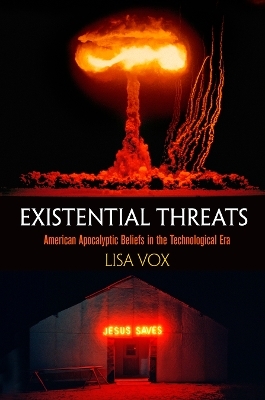
Existential Threats
American Apocalyptic Beliefs in the Technological Era
Seiten
2017
University of Pennsylvania Press (Verlag)
978-0-8122-4919-4 (ISBN)
University of Pennsylvania Press (Verlag)
978-0-8122-4919-4 (ISBN)
In Existential Threats, Lisa Vox explores the growth of dispensationalist premillennialism alongside scientific understandings of the end of the world and contends that these two allegedly competing visions have converged to create an American apocalyptic imagination.
Americans have long been enthralled by visions of the apocalypse. Will the world end through nuclear war, environmental degradation, and declining biodiversity? Or, perhaps, through the second coming of Christ, rapture of the faithful, and arrival of the Antichrist—a set of beliefs known as dispensationalist premillennialism? These seemingly competing apocalyptic fantasies are not as dissimilar as we might think. In fact, Lisa Vox argues, although these secular and religious visions of the end of the world developed independently, they have converged to create the landscape of our current apocalyptic imagination.
In Existential Threats, Vox assembles a wide range of media—science fiction movies, biblical tractates, rapture fiction—to develop a critical history of the apocalyptic imagination from the late 1800s to the present. Apocalypticism was once solely a religious ideology, Vox contends, which has secularized in response to increasing technological and political threats to American safety. Vox reads texts ranging from Christianity Today articles on ecology and the atomic bomb to Dr. Strangelove, and from Mary Shelley's The Last Man to the Left Behind series by Tim LaHaye and Jerry B. Jenkins, demonstrating along the way that conservative evangelicals have not been as resistant to science as popularly believed and that scientists and science writers have unwittingly reproduced evangelical eschatological themes and scenarios in their own works. Existential Threats argues that American apocalypticism reflects and propagates our ongoing debates over the authority of science, the place of religion, uses of technology, and America's evolving role in global politics.
Americans have long been enthralled by visions of the apocalypse. Will the world end through nuclear war, environmental degradation, and declining biodiversity? Or, perhaps, through the second coming of Christ, rapture of the faithful, and arrival of the Antichrist—a set of beliefs known as dispensationalist premillennialism? These seemingly competing apocalyptic fantasies are not as dissimilar as we might think. In fact, Lisa Vox argues, although these secular and religious visions of the end of the world developed independently, they have converged to create the landscape of our current apocalyptic imagination.
In Existential Threats, Vox assembles a wide range of media—science fiction movies, biblical tractates, rapture fiction—to develop a critical history of the apocalyptic imagination from the late 1800s to the present. Apocalypticism was once solely a religious ideology, Vox contends, which has secularized in response to increasing technological and political threats to American safety. Vox reads texts ranging from Christianity Today articles on ecology and the atomic bomb to Dr. Strangelove, and from Mary Shelley's The Last Man to the Left Behind series by Tim LaHaye and Jerry B. Jenkins, demonstrating along the way that conservative evangelicals have not been as resistant to science as popularly believed and that scientists and science writers have unwittingly reproduced evangelical eschatological themes and scenarios in their own works. Existential Threats argues that American apocalypticism reflects and propagates our ongoing debates over the authority of science, the place of religion, uses of technology, and America's evolving role in global politics.
Lisa Vox teaches history at the University of Massachusetts, Boston.
Preface
Chapter 1. Secularizing the Apocalypse
Chapter 2. Race, Technology, and the Apocalypse
Chapter 3. Postnuclear Fantasies
Chapter 4. Spaceship Earth
Chapter 5. The Politics of Science and Religion
Chapter 6. Postapocalyptic American Identity
Chapter 7. Post-9/11 Despair
Notes
Selected Bibliography
Index
Acknowledgments
| Erscheinungsdatum | 03.07.2017 |
|---|---|
| Verlagsort | Pennsylvania |
| Sprache | englisch |
| Maße | 152 x 229 mm |
| Themenwelt | Geisteswissenschaften ► Religion / Theologie |
| ISBN-10 | 0-8122-4919-4 / 0812249194 |
| ISBN-13 | 978-0-8122-4919-4 / 9780812249194 |
| Zustand | Neuware |
| Haben Sie eine Frage zum Produkt? |
Mehr entdecken
aus dem Bereich
aus dem Bereich
die Essenz meiner Lehre
Buch | Hardcover (2023)
Verlag Herder
CHF 51,90
eine Philosophie der besten Jahre
Buch | Hardcover (2024)
Carl Hanser (Verlag)
CHF 34,95


